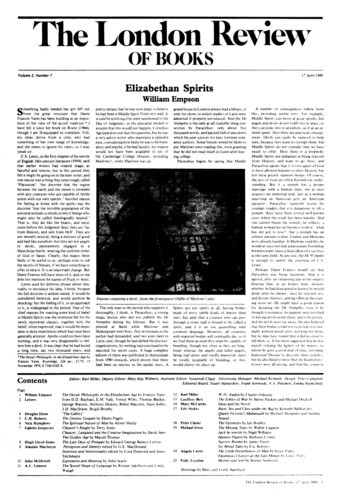If some test-tube baby of the future, or some creature born of spontaneous generation, wanted to know something about mothers, I might recommend Mother and Son for at least one view of that relationship. But for the rest of us, who already know a bit about mothers, most of it comes as less than a revelation.
The book is an autobiography of Seabrook’s working-class childhood in Northampton during and just after the war. He was a twin, and the two boys were brought up by their mother, surrounded by aunts. His father, a feckless, flamboyant man, took off while they were still young. The implication at the end of the book is that Mr Seabrook is homosexual – though he never quite gets round to saying so. He ends with an anecdote about a tiny homosexual encounter with a boy in his class, frowned on by his best friend. He starts his Foreword: ‘This book is about the haunted and obsessive relationship with my mother which, for more than thirty years, was the most total and real experience of my life. It was broken by my first and only relationship with another adult.’ He doesn’t spell it out, but the reader is left to assume that the book is trying to determine what it was about his relationship with his mother that made him gay. The book is mainly devoted to how he sees and saw his mother, and is written sometimes in outraged anger against her, yet she remains an elusive character. She sounds kind and reasonable; deeply concerned for her children, if a bit fussy; immensely hardworking – running a small butcher’s shop on her own. She never emerges as the monster that Jeremy Seabrook often swears she is. It may be that the process of recalling his childhood projected him back into childish thoughts, though he writes in the voice of an adult trying to make sense of his past.
The most casual remarks were sometimes veiled ultimatums, decisions already taken and not open to discussion, but unassailable because they were expressed with a disarming and all-engulfing altruism. She might say ‘It’s raining, you’ll want your new boots on,’ a statement of such plain common sense that it was difficult to perceive the kind of dialogue that was in fact taking place. The annunciatory tone, the future tense, the newness of the boots while she had none, her anxiety about whether our feet were wet or dry, formed a jumble of words, ideas and orders, and amounted to a weight of evidence that it would be absurd and illogical to challenge.
If I really believed I was putting my children through all that when I asked them to put their boots on, I don’t think I’d dare talk to them any more.
Mr Seabrook is not writing here, or in the rest of the book, about any or all mothers, but out of a conviction that his own mother was especially terrible, and that he loved her more than anyone has ever loved a mother. Neither claim is ever quite substantiated. He admits, over and over again, that he was an entirely self-obsessed child, but it is as if even as an adult he has never asked anyone else about their mother, or wondered if they had one too. Having a mother comes to him as a uniquely astonishing phenomenon. But although immensely self-pitying, he is never, at least, self-glamorising. With what must have been painful honesty, he describes himself as a horrid little boy. He describes how little he cared about or noticed other people around him, many of whom he presents, with hindsight, as sympathetic relations. Uncle Fred, a union official, takes him to see a distressed family who have just had a deformed baby, and he cries with disgust. Uncle Fred slaps him and calls him a ‘selfish little sod’. He writes: ‘I was dimly aware of my failed human responses; only I’d no idea of where or how. I felt nothing for the family we had visited.’ When his mother comes in from watching her favourite sister die in hospital, he cares only about whether she is still angry with him from a quarrel in the morning. ‘I saw her wonder for a moment at my insensitivity, the consuming selfishness of my own self-absorption.’ But the mea culpa gets a bit repetitive. After all, all children think that the world revolves around them alone. He was probably not uniquely horrid.
It’s a long time since I read a non-technical book with so many impossible words and phrases in it. ‘She occupied the interstices of my being, the corners of my spirit, the anfractuosities of my mind.’ ‘A light scorbutic dust fell from my eyelashes.’ ‘We climbed into the awkward bifurcation of grey flannels’ (trousers, I think). ‘An irisation of hair under the arms shone in the afternoon light.’
Send Letters To:
The Editor
London Review of Books,
28 Little Russell Street
London, WC1A 2HN
letters@lrb.co.uk
Please include name, address, and a telephone number.

